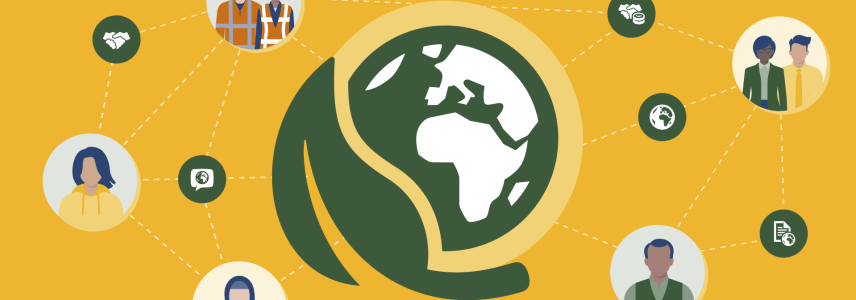CBI's sustainable travel journey

At a time when reducing environmental footprints is more critical than ever, CBI is also making progress in lowering its CO₂ emissions. Every year, CBI tracks its employees' and project participants' flights, resulting in a detailed report. In this report, CBI calculates that year's CO₂ production and compares that number to the yearly goal and the previous years. Afke van der Woude was responsible for this report and shares more on CBI's journey toward more sustainable travel.
CO₂ emission: targets and challenges
Did CBI reach its CO₂ emissions goal last year?
"Yes, we did," Afke confirms. From 2020, CBI aimed to reduce air travel by 25% compared to the 800 flights in the baseline year 2019, and succeeded. The target includes flights by CBI employees, experts, and participants. Each year, the goal is to stay under 600 flights.
What were the new challenges this year?
"We noticed a small increase in employees' flights. We also organised a large expert event in the Netherlands, causing a spike in consultant travel, " she explains. Still, CBI decided to proceed with the event, as meeting each other in person occasionally is essential, allowing for more personal conversations and improving collaboration. At the same time, project participant flights were reduced significantly, partly due to visa issues and a smaller project scope. Overall, CBI stayed on track.
What factors make it easier or harder to meet your target?
"Employees and partners are now more critical about whether flying is necessary for project implementation," she says. CBI has changed its approach: instead of focusing on attending trade fairs, it is now exploring alternative ways to improve export readiness in the partner countries. For example, CBI works closely with national experts to organise local activities.

If flying is necessary, why choose economy over business class?
"We consider it common sense. Besides the cost, business class flights emit up to 4 times more CO₂," Afke explains. In 2019, 9% of CBI's flights were business class. Now, that number is down to just 1%. "It helps that we can book premium economy or economy comfort."
The benefits of train travelling
What are the benefits of using public transport instead of flying?
"For trips to Paris or Berlin, for example, train travel is just as fast from door-to-door," Afke shares. "It is comfortable, you can easily continue to work, and it is better for the planet."
Have there been any positive or unexpected experiences with train travel?
Afke laughs, "Actually, yes. Some colleagues discovered that trains to trade fairs are excellent networking spaces. You meet others heading to the same event, which starts the conversation early."
Does CBI or the Netherlands Enterprise Agency (RVO) encourage public transport over flights?
"Yes, especially for employee travel," Afke explains. RVO's travel policy allows for first-class train travel and discourages flying business class. For experts, CBI leads the way by including train travel in contracts and reimbursing train costs.
Can you estimate the impact of switching to trains on CO₂ emissions?
CBI has not yet calculated an exact figure. Still, Afke estimates that, compared to 2019, CBI replaced 10–15% of flights with train travel.
Going digital instead of travelling
What advantages do online meetings offer?
"They have been game-changers," says Afke. "Even before COVID, we wanted to reduce flights and explore digital alternatives. The pandemic sped up that shift."
Digital tools like MS Teams make regular communication with international partners easier today. "Digital communication also creates greater equality, as partners in low and middle-income countries can easily set up an online meeting instead of waiting for a visit. However, to build trusting relationships and good collaboration, physical meetings remain indispensable."
Employees and partners are now more critical about whether flying is necessary for project implementation
Does CBI promote online meetings instead of travel?
"It is often considered normal now," Afke notes. "Many meetings are online, such as advisory board sessions. CBI now reserves travelling for moments that truly require in-person connection."
What is the impact of going digital?
"Quite significant," Afke says. "Digital communication reduces unnecessary trips and encourages people to plan 1 longer, higher-quality strategic visit rather than several short ones."
What is next for CBI's sustainability strategy?
"We are working toward integration with RVO," says Afke. "Right now, we mostly track manually. We want to automate tracking as part of our work, not as a side project."
She also raises an important point: "A baseline matters. We would have a different picture if we used 2022 as our reference year instead of 2019. But 2019 truly reflects our old ways. We are excited to see which direction our new strategy from 2026 will take us."
CBI's journey is proof that sustainability is not just about cutting flight. It is about shifting mindsets.
Do you want more information? Contact Afke's colleagues at CBI.